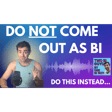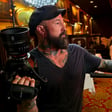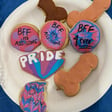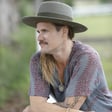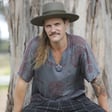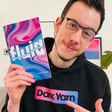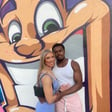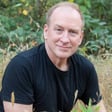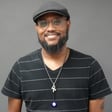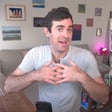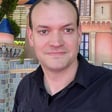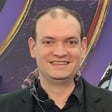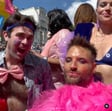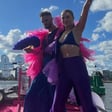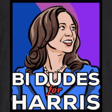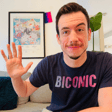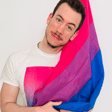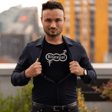Become a Creator today!Start creating today - Share your story with the world!
Start for free
00:00:00
00:00:01

One We Are with Ohene Yaw Ampofo-Anti
Bi+ book season continues with a special guest from South Africa, Ohene Yaw Ampofo-Anti. We discussed his collection of short stories, Simunye: One We Are, which features Bi+ and queer characters, themes, and inspiration, and we chatted about his unique bisexual journey in South Africa and how it compares to his time living in Los Angeles.
There are almost 20 minutes of bonus content with Ohene on Patreon!
Buy Ohene's book (currently unavailable in the USA)
Ohene’s short story, "That Which May Not Be Named"
Book that Ohene mentioned: Boy Wives and Female Husbands
Podcast that Ohene mentioned about King Mwanga
Buy my book, Bisexual Married Men
Transcript
Introduction of the Episode and Guest
00:00:00
Speaker
🎵
00:00:12
Speaker
Hello, everybody. Welcome back to Two Bye, guys. I am Rob. We have a wonderful, interesting new episode for you today. A fan of the podcast and a writer with a new-ish bisexual book. Different from all the other bisexual books we've been talking about. It is a collection of short stories, fictional, with lots of bisexual and queer themes that I've been enjoying reading over the last few weeks.
00:00:39
Speaker
And our guest today comes to us from South Africa, so we'll get to hear about what bisexuality and queerness are like over there. Welcome to Two Bye, guys. Ahine, welcome. Hello. Hi, Rob. Thank you very much for the introduction. Thank you for the genuine, albeit failed attempts at saying my name correctly.
00:01:07
Speaker
But you're excused. It is your first time meeting me, so of course, no worries. Yes, it's nice to meet you after we've been chatting for so long on social media. I'm glad you're a fan of the podcast and I'm excited to chat with you.
00:01:24
Speaker
I'm gonna, I'm gonna try to pronounce your whole name now and give a little intro to who you are for people. Ready, ready for this? Okay. Sure, I'm ready. We have today here, Ahine Yao, I'm Pofo Ante. Did I get it right? Close? Close, Ahine Yao, I'm Pofo Ante.
00:01:43
Speaker
Okay, and he is a South African author and human rights lawyer currently at the Center for Economic and Social Rights in Pretoria, South Africa. He's an alumnus of the University of Cape Town and earned his LLM from UCLA.
Overview of 'Simonie, One We Are'
00:01:58
Speaker
right down the street from me, in 2019, with a dual specialization in critical race studies and public interest law and policy. And his new book, which we'll talk about, is a collection of short stories, and it is called Simonie, One We Are. It crosses multiple genres, voices, time periods, and narrative styles, and it explores themes of race, ethnicity, the long shadow of apartheid,
00:02:26
Speaker
sexual identity and internalized shame, mental health, what it means to be South African, and queer joy. So, welcome again to the podcast. Nice to have you here. It's lovely to be here, Rob. Very exciting to know that, and quite humbling, crazy to think that I'm on a podcast in which such luminaries have
00:02:51
Speaker
I can't list all of them have also graced these airwaves. Quite an honor.
00:03:00
Speaker
Yes, indeed. There are a lot. Sometimes when I think about it, I'm like, I can't believe they all agreed to come on this podcast. Even some of them before we were really cooking. Indeed. Well, now you're part of it. So welcome.
Living and Socializing in LA
00:03:14
Speaker
And I see your UCLA sweatshirt is on for those watching on video, on Patreon, you can see. How did you like LA? That's my current hometown. What'd you think? I actually found it very, very fun.
00:03:29
Speaker
Basically what I did is Thursday, Friday, Saturday I went out. So Thursday we had bar review, which was a play on words, but it was basically just the law students going for a drink. Friday would probably be WeHo, Saturday somewhere or WeHo or the, I don't know if you know the co-op in Westwood, the University Cooperative Housing Association. I don't know if you're familiar with it.
00:03:59
Speaker
So it's basically a student residence, but the thing which is interesting is that it's for students from any college within basically Los Angeles county. So I made a lot of friends there, especially because I had friends from my NLM class who were staying there. So a group of us would kind of chill and hang out there and
00:04:21
Speaker
that we also met people from outside of UCLA and outside of the law
Exploration of Queer Identity
00:04:26
Speaker
school. So it was very fun and lots of time, lots of fun times were had there. Cool. I love it. And we hope for those who don't know is a popular area, West Hollywood, where there are
00:04:41
Speaker
many queer bars and lots of queer joy and some go-go dancers and you can find lots of fun things in WeHo. Cool, so I want to hear how that fit into your journey. So let's start where we often start with
00:04:58
Speaker
Tell us how you identify on whatever spectrums you would like to identify on. What labels do you like and why? And then we'll get into your journey a little. Sure. So I use the terms bisexual and queer. So bisexual for me, I think when I first kind of came out, I think it meant more of the binary sense of attracted to both men and women, because that's the only word that I knew could encompass that. But of course, after
00:05:28
Speaker
more time and understanding the gender binary and all the interesting debates. And I mean, the first time I formed the concept of being bisexual before I even had any awareness of the complexity and diversity of gender. So now I gravitate more towards Robin Oakes definition, which I'm sure your listeners are familiar with. And yes, encompassing definition that is an attraction irrespective of gender.
00:05:58
Speaker
And queer for me is more of a political term because the analogy I like to use for people is that as a black person, we are obviously subject to horrific forms of discrimination in many different parts of the world, whether it was slavery or colonialism or apartheid here in South Africa. And Steve Biko, who's a prominent anti-apartheid activist
00:06:28
Speaker
he coined the term black consciousness. The reason I'm explaining it is because I don't think your listeners would be as familiar to it, whereas South Africans would. The concept of black consciousness, which was really a rallying cry around reclaiming the notion of blackness from one, which was a degrading term used by the apartheid government to dehumanize black people and subjugate black people into a point of pride. And so for me,
00:06:59
Speaker
especially because being Black, you know, my identity formation as a Black person came much way before any identity of queerness. So for me, queerness is similarly a sort of political term in the sense that
00:07:15
Speaker
being queer means that I identify or I'm in solidarity with all those who are marginalized on the basis of not fitting a sort of heteronormative cisgender view of the world. And so that's why I use both the terms bisexual and queer for me. Bisexual is more of a sexual orientation whereas queer is more of a political identity because
00:07:39
Speaker
There's always this conversation that comes up about labels, are labels necessary? Are they not? And I kind of like an article by Jeffrey Weeks called Nestory Frictions where he talks about how identities are needed because without that we can't have community, we can't have solidarity, and we can't have
00:07:58
Speaker
counter power to systems of oppression. So for me, identities are absolutely necessary, even though they can't encompass the fullness of everyone's unique subjective experience. Totally. That's really well put. Our views and feelings on all this are very similar. I also gravitate to the Robin Oaks definition, which we've
00:08:23
Speaker
heard many times on this show, and that has changed as I've changed my conception of what gender is and that it's a spectrum. The bi label may not have always been as full and expressive as it is today, but I feel like most people who identify with it have evolved with our conception of gender. And same with queer, I use that also as a political term and
00:08:51
Speaker
in the same way and that what you said is really interesting because it you know we've sort of touched on this in the past but like this idea of like some people don't want labels and they don't want to label themselves and don't want to lock themselves into anything which which I sort of get on a personal level and that's fine individually but I also understand that like to fight for
00:09:15
Speaker
our community and to move society forward, labels are kind of necessary for many of us. I agree with that, that we have to identify ourselves to each other and to others to have collective power, right?
Intersection of Race and Queerness
00:09:35
Speaker
Is that kind of what you meant or what else comes to mind? Exactly. That's why I think
00:09:42
Speaker
I think it's very interesting when you're a person of colour and queer because I think often then your way of understanding queerness and sort of marginalisation on the basis of sexuality is quite different because you already have some conception of being discriminated against, you already have some sense of
00:10:05
Speaker
othering already, you know, like no one would ask me when did I realize I was black, like I was always black. So to me, I always kind of understand my queer identity in a way that is as sort of strong as my blackness and my black pride as well.
00:10:31
Speaker
Cool. Love it. So let's go to that question. When did you realize you were bi? And tell us a little about my queer journey and how that developed for you throughout your life. Sure. So I know for many people, it's interesting. I always hear those stories about people who say that they realize they were gay when they were like five years old. And I'm like, dude.
00:11:01
Speaker
I don't remember anything from when I was five. I don't even know that I dressed up as Mickey Mouse when I was six because my mom has photos of almost everything conceivable events when I was a child. But I don't generally remember anything.
00:11:23
Speaker
Yeah, maybe I'll just strike share, but I'm always just like, really? What else do you remember when you were five? I'm curious. But I think for me, I think it was interesting because it almost felt, and I think you'll see it in my writing a lot, is that I almost describe the queer journey in terms of
00:11:50
Speaker
I don't know, I always like to use pop culture in the sheer references, but it's almost like it felt like this beast, which was kind of there and appearing and more and more is kind of dragging you away, like this kind of horror movie style, because I think the sort of first impressions were kind of high school. I think I started noticing it, but it was very confusing because I started noticing
00:12:19
Speaker
that when I had already been through the so-called normal adolescent period where I'd felt attraction to girls and had girlfriends and all of that. So then it was very confusing because it was just like, so at first it kind of happened and I kind of just like put it in a box. I was just like, no, what is that? That's very confusing. And I think it kind of reached a point of really being uncontrollable when I was in university.
00:12:49
Speaker
Um, that's when I was kind of meeting a lot of people who I then found very attractive. And that's when it became obvious to me, but like, no, this isn't just some strange thing. This was actually a thing. Um, and it actually ended up becoming quite challenging for me to manage. Um, and I think the first time I actually felt comfortable actually saying,
00:13:18
Speaker
I'm bisexual and actually coming out to people was towards the end of law school.
Journey of Coming Out
00:13:24
Speaker
So here in South Africa, unlike the US, you don't have to do a undergraduate before you do law school. You can just study law as soon as you do metric, which is, um, grade 12 here, we call it metric. So as soon as you're done with metric and you're like 19 years old and you study, see start university, you can start studying. So if you start, uh,
00:13:47
Speaker
law degree in South Africa at that point, then it's four years. And about my third year, I think, was kind of when I first came out to mostly very close friends. And I didn't have any sort of negative reactions, but despite that, it was very, very hard for me to come to terms with that.
00:14:09
Speaker
And the first time I was able to kind of come out to my family was some years later after going through a like bonafide existential crisis. And now, as compared to then, I think I kind of, I had a discussion with a friend of mine who's also the person who started the Amber Johannesburg chapter and
00:14:36
Speaker
It was interesting speaking to him because he kind of talked about how there's different ways of coming out. There's one which is based on a shame or it's almost like you're almost apologizing. Like you're saying, I'm sorry that this is me and please love me. Whereas I think now, if I had to come out as much more from a place of, he described as letting people in.
00:15:00
Speaker
as opposed to a place of shame. And that's what more and more I try to do now. So that's kind of my journey, but very, very much compressed. Yeah, I have some questions about it. That makes sense about the letting people in, we've talked about, but I haven't always heard it framed against the apologetic coming out, which makes sense. I think so many people do it, especially with their family, if they know that it might cause tension.
00:15:38
Speaker
Can I ask what it was like coming out to your family or what what the reaction or result was? So I think the initial reaction was positive in the sense that there wasn't any sort of shame or castigation thrown at me. But I think I met someone recently when I did a book launch or when I was involved in a book pitch and
00:16:07
Speaker
you know, the word he used was it's a journey. So it's it's really like. I think it's a journey. And I think I'll just leave it at that. Yeah, cool. It is. And and when you said you start of started realizing it and coming out your third year of school, was that here in at UCLA or was that in South Africa? Oh, yes, I was at UCT. That was in Cape Town.
00:16:36
Speaker
So that was my third year of my LLB here in South Africa. UCLA was much later. That was 2018 to 2019. Okay. So by the time you were here, you were more out and comfortable, I assume? Yes. Yes. Yes. Because I think a couple of important things happened.
00:17:01
Speaker
So I had my first sort of serious girlfriend some time after I came out. And that relationship was interesting as well. And I think again, you'll see some of that and other things reflected in my writing. And after that, after we broke up, that's actually when I stumbled across Ambi. And
00:17:31
Speaker
When I joined AMBA Johannesburg, the first event I attended was Pretoria Pride all the way back in October 2017. And that was the first time I ever went to any Pride event in my whole entire life. No, it's quite ironic because I mean, I studied at the University of Cape Town in Cape Town, which is a very queer friendly city, but I'd never been to Pride because I was terrified.
00:17:58
Speaker
But I think joining AMBI was quite a turning point for me because when I joined AMBI over the last now seven years since I've been in AMBI, I've met so many people who identify as bisexual and as queer.
Critique of 'It Gets Better' Narratives
00:18:17
Speaker
from so many different perspectives, whether it's race, gender, gender expression, gender identity, nationality, age, profession, and that I've really had a deep exposure to what it's like. And that's given me a lot more confidence in feeling settled in my experience because when I was really struggling,
00:18:44
Speaker
with coming out. I used to watch a lot of those, it gets better videos on YouTube. I watched like, I think a million of them. And to me, sometimes they felt a little bit like they sounded too easy. They just sounded like, oh, you know, this happened and that happened. And then
00:19:03
Speaker
everything was fine. And I think life is not quite like that, or at least for me it wasn't. It's been more of a gradual process on a journey. But I also think that there is something difficult about being bisexual, especially at that time, because
00:19:21
Speaker
that it was just so invisibilized and it just felt like it wasn't something real and something valid that someone could claim. So I struggled for a very long time feeling comfortable and being able to say that I'm bisexual and there's many layers to what makes it difficult from often when you do hear about people who are bi, they're not men, they're women. And as for a black bisexual man, that is like the ultimate unicorn to find.
00:19:52
Speaker
But being in time by meeting people who identify as bi or queer or any sort of non, any sort of sexually fluid identity made me realize that there were so many of us that now if anyone asks me that's not real or what are you talking about, I have like an entire one
00:20:21
Speaker
that we very much exist. So that has been quite pivotal in my journey as I am actually. Yeah, I mean, it honestly sounds like we've had very similar journeys that started around the same time. My first pride was 2018. But yeah, and I had that same experience of like,
00:20:42
Speaker
When it's just me, I kept doubting myself and you can think like, is bisexuality real? I'm the only one, so maybe it's not real. But once you're in a group like that, and for me, I mean, I'm in Ambi, Los Angeles now. Before that, it was bi request in New York City.
00:20:59
Speaker
once I sat in a room with 40 people enough times after many months or years, I was like, well, they're all real. Even if you can't accept it yet yourself, you're like, they're there, they're real. I know enough people to have this confidence that it's real. And it is a nice shield to have community. It is. It's really a lifesaver, I would say.
00:21:29
Speaker
I think like, um, because I haven't experienced biphobia even in the queer community.
Experiences of Biphobia
00:21:37
Speaker
I think there was a point during that particularly difficult period where I went to a local, um, LGBT center and there was a support group and there are two, two guys who I befriended after that. And when I came out as bi to them, you know,
00:21:56
Speaker
I think the older one in particular was really like, no, I think you're confused and like, you know, just said terrible things, just terrible. And yeah, it's quite unfortunate how much biphobia you get from both the straight community and the queer community. But I found at least that in the sort of circles that I'm in,
00:22:24
Speaker
Johannesburg in particular. I live in Pretoria, but I'm often in Johannesburg because it's across the highway. Then in those spaces, people are less problematic like that. Interesting.
00:22:42
Speaker
I'm curious, not to generalize, but just based on your experience, it sounds actually quite similar that there's biphobia and misunderstandings, but that there's also like Johannesburg, there are like queer friendly cities where there's lots of it. When you were here versus in South Africa,
00:23:03
Speaker
Like is how is bisexuality or queerness treated differently in from your experience? Is it or is it pretty similar or and also like is it treated differently over there based on race? I think that's a really fascinating question. I wish we could dedicate the entire podcast because it's a very interesting question.
South Africa's LGBTQ+ Landscape
00:23:30
Speaker
I think it's interesting, right? Because on one hand, South Africa, it's a little known fact that our constitution in 1994 was the first time that expressly in a constitution, sexual orientation was listed as a ground of discrimination. So South Africa's constitution, unlike the pitiful thing that is a 14th amendment,
00:23:58
Speaker
It actually says what discrimination is, and it lists like a whole ton of grounds, including this rest asexual orientation. And because of that, and because of litigation by public interest lawyers in South Africa, slowly but surely, the edifice of homophobic laws in South Africa was torn down. So we had litigation where the crime of sodomy was declared unconstitutional.
00:24:25
Speaker
and eventually in 2005 because of a constitutional court decision that declared the common law definition of marriage unconstitutional because it did not include same-sex couples.
00:24:38
Speaker
Parliament then had to act and pass a law which now enables same-sex marriage in South Africa, making South Africa the first country in Africa to legalize same-sex marriage. And at that time, I think it was just one of like a dozen countries or less in the whole world that had same-sex marriage. So South Africa is quite interesting because on one hand, we have that reality.
00:25:03
Speaker
And we have pride and we have the fact that in 1990, Simon and Coley, who is a famous gay rights activist, who's since passed on, as well as Edwin Cameron, who's since been a justice of the Constitutional Court and Bev Ditzy, who is a famous queer activist in South Africa, they had the first pride march ever in
00:25:27
Speaker
not only South Africa but on the African continent in October 1990. So you have all these sort of interesting things that makes Africa not just different in the African continent but distinct everywhere in terms of how prominent our protection of rights for the LGBTQ community is but then alongside that you have an incredibly conservative
00:25:52
Speaker
culture. You have a lot of problems with a sort of religious inductions which are interpreted to be homophobic. You have a lot of cultural norms which are also interpreted to be patriarchal and homophobic.
00:26:07
Speaker
And in certain urban senses like Cape Town and Johannesburg, there are aspects of life in that city where you could be queer and be safe to some degree and feel comfortable to some degree. But in many parts of the country, that is not the case. And I think America is very similar to South Africa because
00:26:28
Speaker
I think issues of race, class, and geography play a lot into how safe and how free you are as a queer person. I think the only difference is the fact that in South Africa, the law is actually quite categorically on your side, at least on paper, whereas in the US, it's a much more complex picture.
Transition to Fiction Writing
00:26:50
Speaker
So, yeah, but I can answer that question a lot more. We could do the whole thing. No, that's a great overview. It makes so much sense that there's those three, you know, sexual orientation, race, class, and geography and like where you are. I mean, that definitely tracks for America. It's interesting that that's, it's similar in South Africa.
00:27:14
Speaker
And I love the answer with your law degree about how the laws have changed there and how that actually gives some sort of more legal protection than other countries in Africa and even than here. And yet then there's also the cultural aspect. So I want to get to your book in a minute, but that leads me to
00:27:37
Speaker
wondering how did you transition or add in fiction writing to your law career? Because the law influences culture, but also art and storytelling influences culture in very different ways. So I'm curious, when and why did you start writing fiction? And how do you balance that with your law career? How is it related or not related?
00:28:08
Speaker
Sure. So I think writing for me has always mostly been cathartic. It's mostly been a way to kind of heal. And I've always felt like there's a lot of noise in my head. And I have a very sort of active mind, which I think in a very sort of rich emotional life internally, which I think is both a blessing and a curse. It's a curse in the sense that I then feel things very intensely. I get very stuck in ruminations.
00:28:37
Speaker
But on the other hand, when I then take everything that I'm thinking and feeling and transport it onto the page, it becomes very rich and interesting because I then draw directly from my own sort of, you know, mental and emotional life and then sort of just vomit it onto the page and turn it into something. So I've been writing as far back as I started writing poetry towards the end of high school and
00:29:04
Speaker
Most of those poems have never been shown to the general public. They just exist on my laptop. But in terms of more serious writing, in 2015, which was the same year when I was kind of going through my existential crisis, I started writing.
00:29:26
Speaker
novel, which is not yet published. And that was kind of, it had kind of several elements to it. On one hand, I was actually processing my whole sort of bisexual and queer journey. But on the other hand, I was also sort of processing what was happening in South Africa at that time, which was the protests in 2014 and 2015, roads must fall and fees must fall, which were protests by
00:29:52
Speaker
Black students and students of color at, you know, universities in South Africa, especially it started in UCT, my alma mater in Cape Town, and they are protesting sort of like the long shadow of apartheid and institutionalized racism on campuses in South Africa, as well as a more sort of emblematic of the sort of undone business of racism in South African society at large.
00:30:22
Speaker
And so that was the first time that I kind of started writing something a little bit more longer form than just poetry. But then when I started this current job that I'm in, I had just finished clerking at the Constitutional Court of South Africa, which is a very, very busy hectic job. And this job has likely had a bit of
00:30:46
Speaker
a better sort of more manageable sort of work-life balance. And so I started challenging myself with just writing short stories by sort of submitting to competitions or literary journals that had calls for publication or calls for input, calls for submissions. Sorry, my language. I'm stumbling over my words. But it wasn't that that process that I started writing short stories in particular, which
00:31:16
Speaker
Before I'd felt like, I don't know how to say a whole story, you know, beginning, middle and end in like 5,000 words or 6,000 words.
Writing Horror and Queer Narratives
00:31:26
Speaker
But in the end, I've come to actually quite love short stories. And there've been a way to explore ideas which I can't write like, I don't have the time to write like six or seven novels, but I do have the time to write six or seven short stories. Cool, awesome.
00:31:53
Speaker
Yeah, so let's get into the book, which which I loved. And this collection. So it's called Simunie One We Are. And what's really striking about it and what I guess you get to accomplish with a collection of short stories that
00:32:10
Speaker
you can't necessarily with a novel is how different each story is. It's different in terms of the narrator and the point of view, the tone, some of them interspersed poetry with prose, some of them are really
00:32:29
Speaker
hyper magical realism or I don't even know if that's the right term but sort of have these spiritual supernatural magical elements to them some of them are very grounded uh they're all and some of them are kind of scary and intense uh whereas others are i'm glad you were scared yeah some of them are like unexpectedly intense right yes you were you're glad you're glad i'm scared
00:32:59
Speaker
I'm glad you're scared because what's behind that smile is probably the story you're referring to as scary. Yeah, yeah, yeah. I mean, there were a couple but there's one that's pretty, pretty dark and murderous.
00:33:18
Speaker
Can I give the backstory to that story? Yeah, please go for it. So the reason why I'm happy that you're scared and otherwise I'm not a sadist, I would not be happy that you're scared.
00:33:32
Speaker
But the reason I'm happy is because when I was submitting that story, it was for a literary magazine and their next edition was on horror. And I'm not a huge horror fan, like just in general of the genre of horror. I've never like read horror books, you know, voraciously. I've never like watched horror films a whole lot.
00:33:57
Speaker
Most of the time I tend to just think they're very silly. So it was a good challenge for myself because I was like, I don't really understand, even understand this genre. I didn't really appreciate it, but I'm going to try and do this. So the person who has made me change my mind on horror is Jordan Peele.
00:34:18
Speaker
When I watched Gennons, I was like, okay, horror can be interesting, to say the very least. And I've loved all of his films. And I kind of, as I was writing the story, I watched some Alfred Hitchcock
00:34:35
Speaker
films, which I had never watched, but I'd always heard and raved about. And when I then looked at Alfred Hitchcock and Jordan Peele, then I realized I kind of like social commentary dressed as horror, less so than just horror for the sake of as an end in and of itself. Just that's my personal taste. So that's kind of what inspired that story. It was actually a nightmare that I had where
00:35:02
Speaker
and where I'm hooking up with someone and they turn into a monster. So that's actually what was actually a dream that inspired the story. And then from that, I then thought that the how train would be interesting and then kind of, yeah, so yeah, that's kind of how that story evolved. And I, I'm happy to know that someone thought it was scary, because then I feel that
00:35:26
Speaker
I've accomplished something which I think is quite difficult for me in particular to do. Yeah. We'll go back to some general questions in a minute, but since we're already talking about this story, let's talk about it. There was also another one that's a little scary about duality. Duality is an ancient thing.
00:35:45
Speaker
But the one you're talking about now is what's behind that smile, right? Where they're on the train. Yes, that's why they're on the train. What's really interesting to me about that one was it's these three point of views.
00:36:01
Speaker
There's Neo, and Dumiso, and Noxolo. I'm probably pronouncing that wrong, but those are the three characters. It's fun. It's Nao. Nao is the first character you encounter. They're Noxolo, so it's a click and toss up.
00:36:19
Speaker
Of course, you wouldn't be expected to know that. And then Indumisa is a jock who has a sort of like, well, yeah, I don't want to give spoilers, but yeah, Indumisa is a sort of rugby jock character.
00:36:34
Speaker
Yeah, I don't want to spoil it, but just to give people an idea, they're both these closeted by guys. I think you used the word closeted in the story like LGBT, but they're missing the C or something because they're both closeted. They're seeing each other on the train.
00:36:58
Speaker
And they're having this eye contact connection and yeah, they hook up and then sort of this other magical, horrific stuff starts to happen and we jump around from the three different point of views. So yeah, what I mean, what I love is like,
00:37:24
Speaker
There's a lot of queer joy in this book. There's a lot of queer joy in my life. There's so many things that expanded for me as I came out. But there's also a lot of thoughts that went through my head during that process that were scary. And we're like, what if I die? And what if my desire leads me to someone who
00:37:44
Speaker
is not a good, like is, you know, is gonna want to harm me. And you do, when you open yourself up, you open, there's many great things about that, but you can potentially open yourself up to harm.
Emotions and Masculinity in Queer Stories
00:38:01
Speaker
And so that was sort of what resonated with me. Like, can you talk a little more about what inspired you to go this way? I think what I liked about the story was the idea of,
00:38:14
Speaker
I think as queer people, I think shame, and I'm a big fan of Brené Brown as well. I don't know if you happen to be as well. Yeah, I haven't dove into her stuff like others, but I'm aware. What do you like about her? What I like about her is how she talks about shame. And I think shame is a topic of relevance to the whole of society.
00:38:42
Speaker
definitely especially for queer people because we deal with shame so much. And I think I like the idea of shame almost becoming embodied like this beast because that's how for me in many ways when I kind of first started
00:39:01
Speaker
realizing that I had the sexual attraction, it felt a bit like this unwieldy creature within me that was kind of like taking control of me. That's kind of why I explore that theme again in duality as an ancient thing, because there the idea was actually anxiety is something that I struggle with a lot. And so the idea is how emotions then become the thing that you're almost tethered to.
00:39:30
Speaker
um but it's like they have a life of their own because often at least i feel like my thoughts and emotions have so much power that they feel like something something outside of me um so i think those those stories are trying to kind of describe that sort of experience especially from a queer perspective yeah interesting yeah and the duality
00:40:00
Speaker
it just really makes you think like what are you capable of? Like what am I capable of that I might not even realize in both good and destructive ways? It's like scary to have that power and it also just
00:40:16
Speaker
you know, they're like when we see hate crimes and stuff, it's often because there is something within that's unaddressed, right? That that that bubbles up and spills out and, and the people committing these like committing hate crimes are probably unable to look inward or like unable to address something and they direct the hate like self hatred gets directed.
00:40:41
Speaker
outward. I don't know that's what that kind of made me think of and it's like a cautionary tale but it really dives into that perspective and how and how you might not be able to control yourself or if you can't even really understand yourself. I also think that having had you know challenges with
00:41:06
Speaker
trying to maintain my mental health and having to then develop practices to maintain my mental health. So I do a lot of meditation, I'm very into things like mindfulness, I have a gratitude journal, I journal every day. I think I kind of realized because there are many times when I kind of felt like but it feels and it's also a commentary on masculinity in many ways because
00:41:30
Speaker
as men, it feels like we're not supposed to have emotions. We're only supposed to have certain emotions, but we're not supposed to feel or feel too much or be scared or feel lonely or cry or have any of these sort of vulnerable emotions or have any vulnerability at all. And what you were saying about the hate crimes is that I think that what I wanted to respond is to say that I think there are often times when I felt like
00:42:00
Speaker
Why do I feel so much intensely? Why do I feel so intensely? And especially as a man, I feel like I'm not supposed to, you know, I'm supposed to just be stomach, I'm supposed to have this stiff upper lip kind of thing. And I think what I started to realize when I observed slowly is actually everyone has a mental health practice. Everyone has a self-care practice. It's just some people aren't using, you know,
00:42:28
Speaker
courage methods or someone using destructive methods. That's part of the reason I mean, I'm not a psychologist or sociologist. So I can't, you know, please take this with a grain of salt. I'm a lawyer. But I mean, the reason why people, especially men, drink so much, get so angry, fight with people, beat people up, these are all coping mechanisms. Like they're not
00:42:53
Speaker
going to coping mechanisms, but they're coping mechanisms. So I think it's also, I'm trying to describe in ways those difficulties that you feel, especially as a man, that you have these emotions, but you're not really sure what to do with them because you've kind of been taught that you're not supposed to feel in the first place. And that's particularly maddening.
00:43:22
Speaker
Yeah, that makes so much sense. I mean, it's like I see this all the time of like, and it was hard for me too, but it's so hard for many men to access their feelings, name their feelings, and then say them out loud, have community with other men around feelings. Like, these are just not things that were conditioned to do, but they are so important. And it's crazy that we're
00:43:49
Speaker
not conditioned to do that because then it spills out in all these other ways. I haven't heard that before, but you're totally right. It totally makes sense that those are coping mechanisms and so are other destructive things. And if we don't learn how to just talk about feelings and address them, it's going to spill out in these other ways. I just have one more question about what's behind that smile.
00:44:15
Speaker
I loved the three points of view, but it's interesting. It's really like these two guys are hooking up. And then there's this female character who's sort of seeing this and you get it from her perspective and see her gaze on this. I was curious like why you chose to include her and also end the story with her. The story ends with her, not with one of the two guys.
Spirituality and Cultural Roots in Queer Writing
00:44:42
Speaker
I was wondering what what was your intention with with that and with her character? I think what's interesting about no no color is how she then becomes a way of like much like it's kind of her perspective then flips things a bit because it's like to her she quite she doesn't quite understand these two guys she doesn't quite understand
00:45:11
Speaker
what they're doing, but in a way the way she's observing things kind of brings in the whole.
00:45:19
Speaker
the whole question of shame as well because in a way when she's kind of judging them it kind of ties into the whole theme of shame and othering and they're not doing what they should be doing and they're not being real men you know like so that's part of that but the reason why it ends with her isn't so much as the importance of it ending with her as
00:45:44
Speaker
just when I kind of read up about how a horror should end, is that it's supposed to leave you with this sort of unnerving feeling. And because of what's happened to Nell, leaving it with her realization is what makes it very unsettling, which from my Google-based search of how to write a horror story is how horror is supposed to end.
00:46:14
Speaker
I like it. No, that makes sense. It was an unsettling ending. It was kind of like, you know, you want to know sort of what is happening within the two guys' heads and we only get this other perspective. But I thought her
00:46:31
Speaker
know that female gaze on these two guys and what did she think and why was she you know everyone else on the train kind of disappears and then but the three of them are still there and it was just interesting like what is what what does this mean anyway i i we gave a couple spoilers but you'll have to everyone can go read the story and see how you interpret it
00:47:03
Speaker
I want to get to the title story before we have to move to the Patreon break for bonus content. So let's talk about Sumunye 1 We Are. That's the title of the book and also the title of one of the stories. And this story really has a lot of
00:47:22
Speaker
queer joy and the ancestors and the sort of I can see why this is the title story it's the you know to me it was like felt like your core message of what is queerness to you and so we I have some quotes I'll read but let me ask you like what was the inspiration for this this particular story
00:47:44
Speaker
So this story, the reason why it was about spirituality was also because at the time, the literary magazine that I wanted to submit it to, its theme at that point in time was on spirituality. So at first when I was like spirituality, I was like, I don't know what the heck to write about that. But then I started, I just came up with this character and it's very much
00:48:09
Speaker
semi-autobiographical in some parts and kind of that difficult question that's kind of on two levels. So on one hand, we're told that homosexuality, bisexuality, any sort of queerness is un-African. So it's kind of trying to reconcile your
00:48:30
Speaker
roots and heritage as an African with your sexual identity. And then on the other hand, when one explores a whole suite of religious traditions and faiths, many of them at least very orthodox interpretations
00:48:48
Speaker
propagate very sort of homophobic and biphobic tropes. So the idea was that this character is trying to now reconcile who they are with trying to feel at home with the Africanness. But the reason why the story then takes the time that it does is because I started reading a book called Boy, Wives and Female Husbands, which is a study from quite some time ago.
00:49:17
Speaker
which is about pre-colonial sexual identity and gender identity in Africa. And what they do in that book, which is quite fascinating, is a kind of an notions of
00:49:34
Speaker
diverse gender or sexual orientations in Africa that existed long before colonization and long before the sort of religious indoctrination in particular that came with very Victorian era values of binaries of sex, which were then imposed on people across the continent. And what is interesting in that book is that there are a lot of people who talked about
00:50:02
Speaker
queerness almost being divine and that in their community, they're like a third gender, but there was also like this relationship in some cases between
00:50:14
Speaker
being that third gender. And because you are neither male nor female, you have the sort of divine energy. And so there is a relationship between people who would engage in healing type of work, traditional healing, and people who are queer and a sort of like interpolation between the two. And I found that fascinating because it's like not only was queerness normal, it was divine, which like,
00:50:44
Speaker
feels like it flips. And that wasn't, you know, speaking for everywhere on the concert, but it was particular places where that kind of came up. And I think I recently read a book, but I think was after I wrote the story, which is also about two spirits identity in the Americas, which similarly tries to kind of uncover sort of diverse notions of sexuality and gender.
00:51:09
Speaker
amongst native people in the Americas before the missionaries and before colonization and sort of Catholic Catholicism. And again, you also find some of this notion of not only is queerness normal or just, you know, whatever, just regular, but in some cases, even some sort of divine calling. So to me, that was quite remarkable. Like, I expected to find like,
00:51:39
Speaker
things which were normalizing queerness or just people just kind of carrying on about their lives and it not being this big deal. But I certainly didn't expect it to go from being an abomination to divine. So I quite loved that way of totally flipping things on how they are right now on the continent where it's regarded as an abomination. So to me, that was quite powerful. And that's kind of where this idea came from.
00:52:10
Speaker
Yeah, I love it. It makes so much sense. Like, I've I think I've seen especially in the bi community and also the general queer community that there's a push to spirituality as opposed to organized religion. I learned that from all the inner like all the interviews in my book, like just a lot of the guys I interviewed were gravitating away from the strict rules of religion, which have often recently been sort of
00:52:40
Speaker
corrupted, I'll say, by these binaries and by hierarchies and by shame and stigma of certain things and how you should be. And they're moving toward spirituality, which feels more open and expansive. And it taps into these things from the past. So it's not all new that queerness is popping up. It's actually really, really old.
00:53:06
Speaker
And it was conditioned out of us by capitalism and patriarchy and white supremacy and all these other categories and binaries. And actually, if we look back to the ancestors and what you said about two-spirit people and Native Americans, like, yes, this stuff has existed. And I love this story because it's tapping back into that. So in this story, not to give too many spoilers, but
00:53:35
Speaker
They go, the main characters go to this club like a queer nightclub. Is that sort of basically accurate? They meet queer ancestors, Marsha P. Johnson, Sylvia Rivera, James Baldwin, Freddie Mercury, which I loved. And I want to read a quote.
00:53:56
Speaker
I forget who says this. I didn't write it down, but I pulled this out. Somebody says this to the main character. He says, the ancestors are always guarding you, watching over you, protecting you. He says, protecting me from what? I ask. Quote, After the white man came to our continent, he led our people astray.
00:54:15
Speaker
Now there are these binaries like black, white, gay, straight, man, woman. But before they came, people such as you held true knowledge. You see your queerness is magic, which I loved. I don't know what my question is, but it makes sense. And then it also, and can I read the ending? I know this is sort of a spoiler, but it's such a lovely story.
00:54:43
Speaker
The ending, the main character is reflecting on this experience and basically says, well, this is narration. I feel overcome with joy and this deep sense of
Queerness as Magic and Community
00:54:56
Speaker
knowing. I realize now that my bisexuality is not sinful. It does not make me a heathen. I realize that I am in this world, but not of this world. I am divine. I am magic. My queerness holds the key.
00:55:14
Speaker
to my own writing, but I also love it. Oh, yeah, do it. I'll stand for that, too. Yeah, I mean, it's quite clearly a beautiful sentiment. What does it mean for you? And was it difficult for you to reach that conclusion yourself? Like, are you really there? Do you, you know, is that how you feel?
00:55:42
Speaker
Well, you know, I think it was, it's, it's, it's, what's been interesting, it's actually been missing from your podcast, because many of your, your, your discussions have kind of focused on what are sort of the gifts of being queer, what are the sort of gifts of being bisexual, and one which I found quite powerful is
00:56:04
Speaker
that's come up in quite a lot of your discussions with your guests is the idea that you don't just start questioning the binary between the binary of sexuality and then the binary of gender, but you start questioning all binaries. And so in this way, bisexuality becomes almost this way to see the world totally differently or maybe even imagine the world anew. And that's quite
00:56:34
Speaker
incredible because I don't think I had initially thought of queerness as not only trying to embrace it as something that's just part of me, but also something that's a gift and, you know, and by in particular,
00:56:51
Speaker
and having this community, and not just Amba, there's quite a vibrant queer scene in Johannesburg as well, and kind of being in those spaces, especially another thing that's in Munier and other stories in the book.
00:57:07
Speaker
try to capture is also the sort of vibrant queer scene that's emerging in contemporary South Africa where there's a lot of queer friendly spaces which are being set up by people of color, by queer people of color, for queer people of color, kind of in their own terms. And when I was a teenager,
00:57:29
Speaker
I would never would have imagined that such spaces would exist. And as I said earlier, despite legal recognition and despite having rights in the constitution, queer people have never come out so visibly and strongly.
Creating Queer-Friendly Spaces
00:57:45
Speaker
So to see young black people in South Africa who are queer kind of claiming spaces for themselves and setting term, creating these spaces on their own terms,
00:57:57
Speaker
that's part of what's kind of given me a sense of joy and a sense of imagination and there's always been this thing overseas that I've observed where the finest parties
00:58:09
Speaker
of queer parties, and that was never really the case here in South Africa. That wasn't really a thing here. But increasingly, it's becoming a thing here as well now, because there's Vogue Night's Jersey, which is a vogue ball which happens in Johannesburg, which is just incredible, which is what inspires the last story in the collection, my bouille. And increasingly, you're seeing
00:58:36
Speaker
queer people who are DJs or artists or photographers who are doing all sorts of things, you know, on their own terms. So they're not waiting for people to see, you see again, that sort of black consciousness, but in queerness as well. So it's like, they're not waiting for someone, the government or whoever to include them or create spaces, but they are claiming those spaces for themselves. They are creating those spaces for themselves. And, um,
00:59:06
Speaker
I think it was Stokely Carmichael who said something like, we don't wait for freedom, we take it. You know, freedom has to be, it's not given to you, you claim it. And I kind of see that happening now. And that gives me a lot of hope. And there's quite a lot of beauty and irreverence and queerness that I'm beginning to feel. Yeah, beautiful. I love it.
00:59:42
Speaker
Thanks for listening to this episode of Two Bye, guys. Book season is almost over. The season finale is next. I have an awesome interview for you guys with R.K. Russell coming back to the show. He was the first NFL football player to come out as bye. We talked about four years ago, and now we're talking again about his new book. It's a memoir.
Bonus Content and Book Availability
01:00:01
Speaker
But in the meantime, there's more with Ahimi.
01:00:03
Speaker
There are almost 20 minutes of bonus content for this episode, and it's awesome. You won't want to miss it. We talked about one of his stories that is not in his book, but is publicly available online. It's a very, very short story. It's called That Which May Not Be Named, and you can find the link to it in the show notes. You can check it out. I really love this story. It's about a bi guy who's coming out to someone for the first time.
01:00:27
Speaker
and doesn't necessarily get the best reaction and it's about sort of what happens internally with him after that. It's really beautiful and it's very relevant to things that I hear all the time from bi people, especially as they're starting to come out, so I really recommend checking out that story. It's online.
01:00:44
Speaker
But you have to go to Patreon to hear us talk about it. We also talked about the duality between the individual and the community, which to Ahini is embodied by the African philosophy of Ubuntu. It's really interesting. I was fascinated by where we left off this discussion. I wish everyone could hear it.
01:01:02
Speaker
But you can over on Patreon, and for just $5, you can listen to it and support my work and the continuation of this podcast. And you also get bonus content for all the past two seasons and future episodes. You get video of the same past two seasons and future episodes. You get early access when I finish editing each episode. And you also get some bonus clips and random content that I'm continuing to add to.
01:01:28
Speaker
So head over to patreon.com slash Robert Brooks Cohen, you can listen to 20 minutes extra of this episode. And now here is the conclusion of my interview with Ahini.
01:01:47
Speaker
Thank you for being here. This has been a lovely conversation and I really enjoyed reading the stories. Where can people find you and follow you or find the book and purchase the book? So unfortunately with the book, it's not yet available overseas, which I'm trying to work on at the moment. So right now it's only available in South Africa. It's available
01:02:15
Speaker
at Bridge Books and Love Books in Johannesburg, and that's available at the Book Lounge and Clark's Book Shop in Cape Town. And if you're overseas, if you happen to be at the following universities, you can get it from your university library, so any of the Ivy League schools except for Brown, UCLA at the Law Library, Emory University, and Iowa State University.
01:02:42
Speaker
Um, it's at the library, so I'm not sure exactly which library, but that's where it's available. But I do have plans to hopefully get it more widely available. So that's still something I'm working on and hustling towards. Cool. And in terms of social media, people can follow me at Ohini.writes. That's my writing page on Instagram that people can follow for all my updates on my writing. Awesome. Cool.
01:03:11
Speaker
So follow him there, we'll put all of that in the show notes, and keep me posted if the book becomes available. I'll...
01:03:19
Speaker
I'll post about it from to buy guys to let everyone know.
Hopes for Future Conversations
01:03:23
Speaker
And there's the one story that we talked about, it'll be in the bonus Patreon content. So you might not everyone might not have heard that. But there is a story called that which may not be named. And that is publicly available. It's on the internet. So I'll include the link in the show notes. So if you're
01:03:42
Speaker
itching to read some of this writing before the book is available, you can at least read one of these stories that that was also the first story that I read. That's about coming out a by coming out story. That's fascinating. And you can hear hear our discussion about it on Patreon. So cool. Thank you. Thanks so much. This has been really interesting. And I look forward to
01:04:09
Speaker
reading more of your work in the future and seeing what else you come up with or what maybe some stuff you do in your law career that we can talk about when you come back to the podcast in a few years. Sure. Well, thanks so much, Rob. I'm really glad we finally managed to make this
Podcast Credits and Acknowledgments
01:04:27
Speaker
happen. It was really lovely speaking to you and it feels very cool to be part of this conversation and hopefully
01:04:36
Speaker
through me hopefully maybe some other African guests might appear on the show if they hear me and approach you and also want to be featured and we can get more of a transnational conversation on bisexuality and queerness going. And I can't wait to read your book. It's not easily available here. I need to order on Amazon. But I do want to get around to reading it. I'm very interested.
01:05:03
Speaker
in reading because I listened to all your episodes with the guys who participated in the study.
01:05:11
Speaker
Oh, nice. Awesome. Cool. I can't wait for you to check it out. There's, it's, you know, we obviously like have different backgrounds and different cultural context for this stuff. And your, your writing is fictional and, and very, um, there's a lot of magic and, and spirituality and stuff like that in it. And mine is very, you know, is documentary. And yet there's still a lot of similarities I noticed and a lot of the things that
01:05:40
Speaker
we think in the internal lives of the characters in my book and the characters in your book there's there's so many similarities and so I think there's like in the world we live in when you identify this way and see the world this way
01:05:56
Speaker
and yet live in a binary world, a lot of these same thoughts and feelings will come up. So we have very different books, and yet there's like a core in there of queerness and queer joy that unites them. So everyone check out the book when it's available, and thank you again so much for being here, Ohine. Thank you. Take care.
01:06:26
Speaker
Two Bye Guys is produced and edited by me, Robert Brooks Cohen, and it was created by me and Alex Boyd. Our logo art is by Caitlin Weinman. Our music is by Ross Mincer. We are supported by the Gotham, and we are part of the Zencaster Creator Network. Visit patreon.com slash Robert Brooks Cohen for bonus content, early access, and exclusive video episodes. Thanks for listening to Two Bye Guys.
